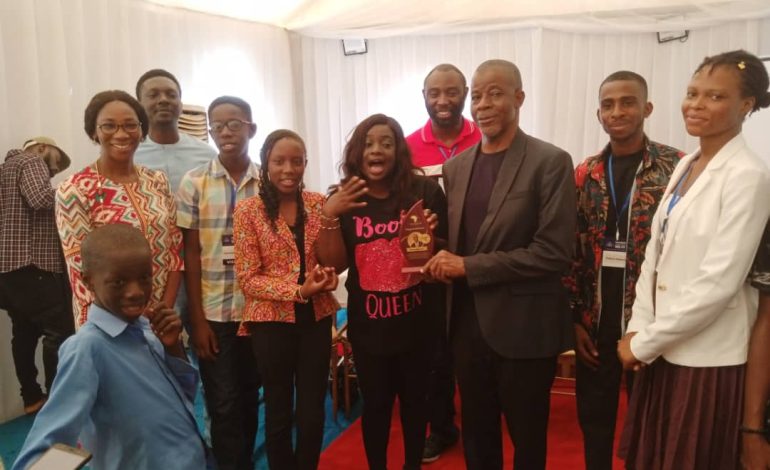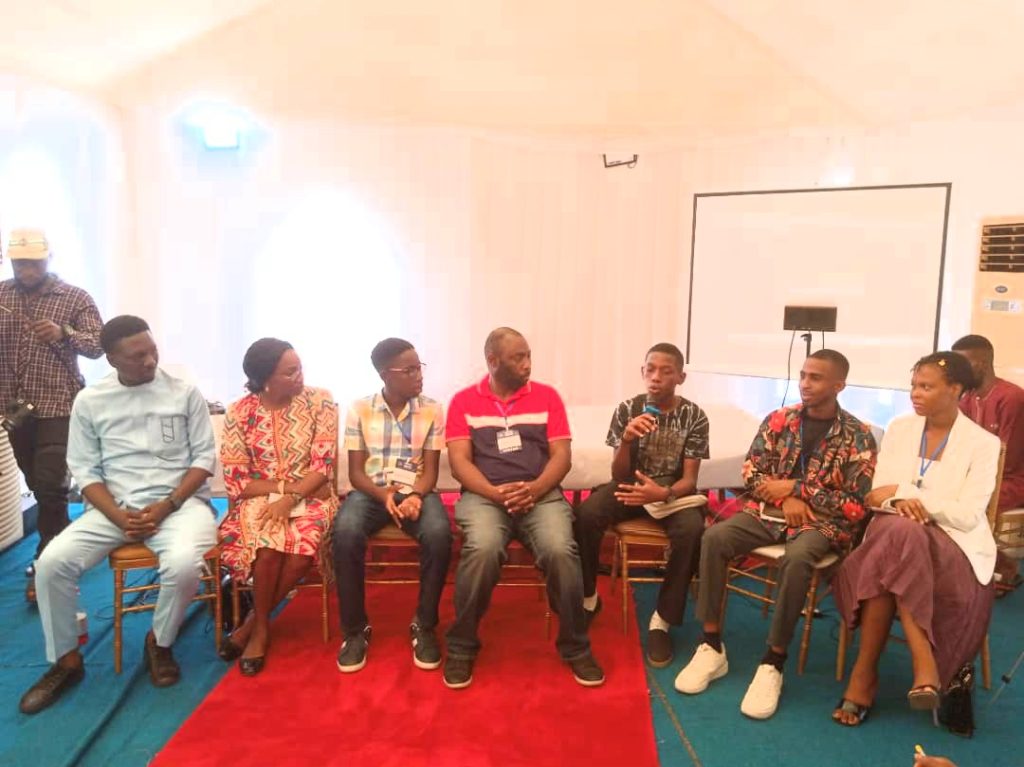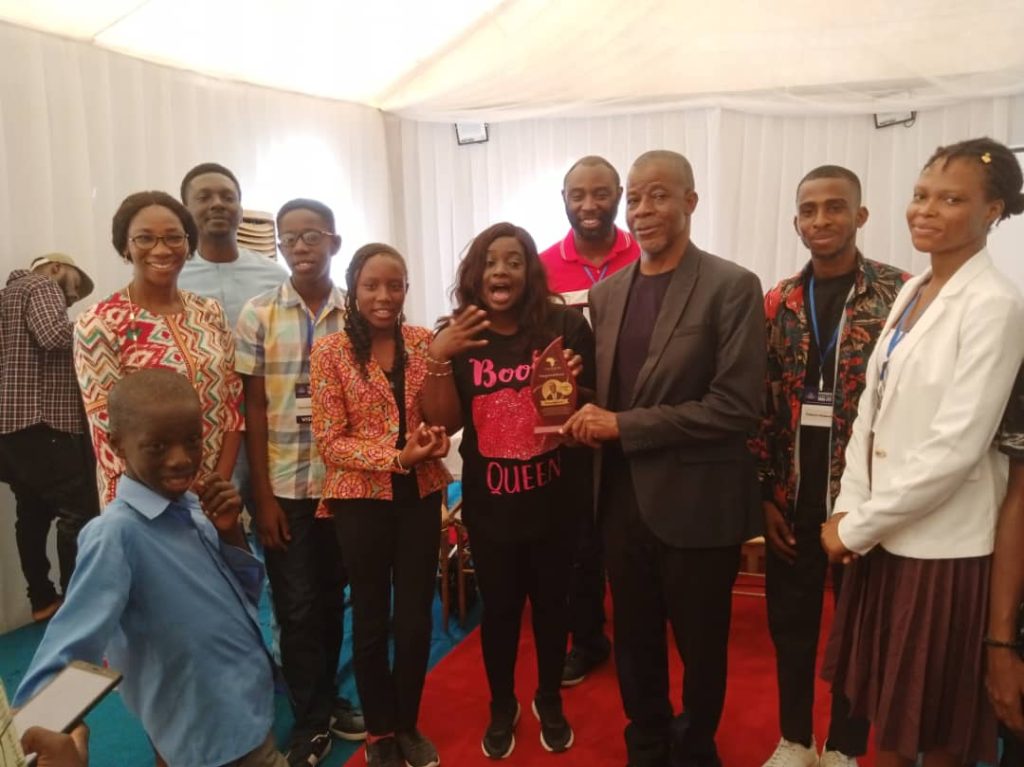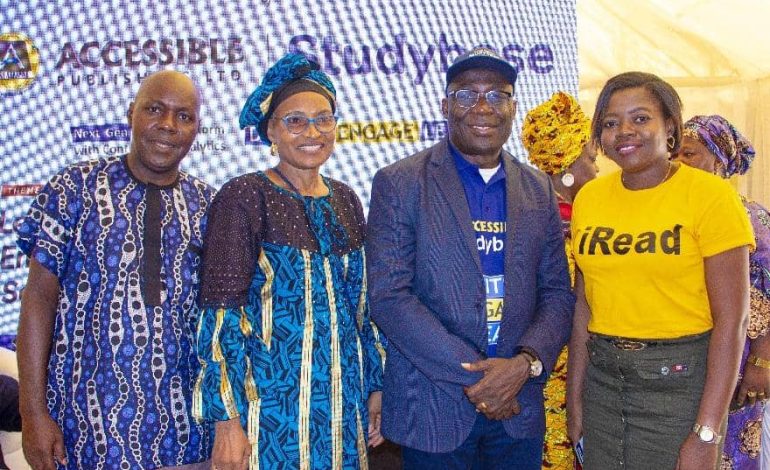Book clubs seek lifelong reading habits among Nigerian youths at book fair 2024

* ‘I found reading to be my time of escape into the world of the characters of the story I was reading’
* ‘Find out what attracts a child and you will get them to read‘
By Godwin Okondo
THE Nigeria International Book Fair (NIBF) 2024 edition that held from May 6 – 10 brought together book and reading advocates, educators, and enthusiasts to explore strategies for nurturing a lifelong reading habit among Nigerian youths. Featuring diverse panel sessions and discussions, the fair focused on the importance of literacy and the role of reading culture in shaping the country’s future. Among the highlights was a thought-provoking panel session titled ‘Nurturing a Lifelong Reading Habit Among Youths: Experiences, Challenges, Solutions, and Strategies’, which had esteemed personalities dedicated to promoting child education and fostering a culture of reading among the youth demographic. It was organised by the Network of Book Clubs and Reading Promoters in Nigeria (NBRP).
The session, which held on Friday, May 10, featured the founder of Ignite Africa Leadership Foundation, Mr. Adekunle Smith, a youth advocates, Kelani Mercy Timilehin and Fadairo Kunle Abayomi, Executive Director, TalentPlus Resources International, Aderonke Kimemenihia-Eseka, a student and YouTuber, King Solomon Olurotimi and another student, Tamunoemi Tasie. The session was moderated by the founder of Tolulope Book Club and professor at the Department of Agricultural, Food, and Resource Economics, Michigan State University, Prof. Oyinkan Chukwuka Tasie.
The President of Network of Book Clubs and Reading Promoters in Nigeria, Mr. Richard Mammah, while welcoming guests to the session, stressed the importance of making reading a lifelong culture among Nigerian youths: “This is a very remarkable session because it attempts to address issues about the reading culture. Two words jump at us: the act of reading, to be immersed in the pages of a book and being engrossed in the contents. In the culture, anyone can read. For it to be a culture, it has to be ingrained and continuous.
“We must be deliberate in not just getting our young people to imbibe the culture, they need to identify with reading while they are still in the school system. It’s important for us to nurture the habit. To move from reading to culture requires continuous activity; so, nurturing the reading culture to be a lifelong activity is what we are talking about. You could read until the book becomes your best friend. People who read will continue to move forward.

Legal practicioner and founder of Ignite Africa Leadership Foundation, Mr. Adekunle Smith (left); Executive Director, TalentPlus Resources International, Aderonke Kimemenihia-Eseka; student, Tamunoemi Tasie; founder, Tolulope Book Club and professor at the Department of Agricultural, Food, and Resource Economics, Michigan State University, Oyinkan Chukwuka Tasie; student and YouTuber, King Solomon Olurotimi; young writers, Fadairo Kunle Abayomi and Kelani Mercy Timilehin at the panel session by Network of Book Clubs and Reading Promoters in Nigeria at the Nigerian International Book Fair 2024… in Lagos
“Young people, you are in the right space; imbibe the right culture, and you need to be determined to make a decision to keep this culture and sustain it. I want to thank everyone here joining us for this session, and I want to thank our partners, the Committee for Relevant Arts (CORA), our brother Jahman Anikulapo, and everyone else in the room. You are all valued. Let’s have a good time.”
According to culture communicator and CORA chair, Mr. Anikulapo, “I believe part of the problem we have in this country is that we didn’t put the interest of most of our young ones first, and most of the people here run book clubs, educating young people. We need to make sure our children are informed. You must insist that you are the leaders of today. If you don’t cultivate the habit of reading now, it’s going to be very difficult in the future.
“When you engage with a written text, it stays a long time with you. There’s a process of writing and there’s a connection between the brain and your hand, but when you’re typing on the phone, it doesn’t go that way. If you want to write an essay, ChatGPT can do that for you, so where is the process of thinking? In school we used to have book clubs, and we were members of literary and debating society, and drama club. At Edo International Art and Book Festival (EDIBAF 2023), there were about 1,000 students in the room and when I asked if they had these clubs, they said no. What are they being taught? We have to validate the work that people like Funmi Ilori of iREAD and others are doing.”
“I run a book club and what I do is to ask the children the meaning of an unfamiliar word, and some of them have phones and iPads, but I always tell them to get a hard copy dictionary,” Prof. Tasie said. “Growing up, some of us didn’t have phones and it was fun looking through the pages of a dictionary. During the recent JAMB, 76 per cent of those who sat failed. So, only 24 per cent passed, and this hinges on what exactly is going on amongst our youths, because the majority of those who sit for this exam are youths. We would like to know what is going on, and understand the problems before we can get a solution. NBRP has put together a robust set of young ladies and gentlemen to walk us through this conversation.”
While sharing his own experience on reading, Master Olurotimi said, “I started reading when I was three. My mom read bedtime stories to me and registered with Aunty Funmi’s book club (iREAD). Reading is almost like travelling. You can sit at a particular spot, but at that moment, you are in a different part of the world. You just have to connect your mind and emotions to reading to understand the way the world flows.”
Kelani spoke on how to nurture a reading habit when there is no access to books, noting, “Many people know what it means to read, but not many know what a reading habit is and what it takes to nurture it. A reading habit is a behavioural routine of you reading books on a regular basis, so much that it becomes a subconscious act. Doing that consistently, it becomes part of you and you don’t feel okay when you haven’t done it in a day.
“Nurturing a reading habit starts with commitment. You have to make up your mind that you want to read everyday. You start consistently, and ensure you achieve the goal. Nurturing a reading habit is a must for everybody. You don’t have to be an author or a student. Anybody can do it. Reading improves one’s life, improves your creativity and imaginative thinking, and helps you know what goes on around you. Nurturing a reading habit is something that would help you in every endeavour of your life. When you are able to train yourself, you can apply consistency in every other thing you do.”
Speaking on innovations to push reading habit for people who don’t have access to books, Smith said, “One of the things I discovered is when you want to work with people in such situations, work with what they have. Work with their circumstances. I’ve gone to places where parents don’t want their children in book clubs because if they tear the book, they won’t be able to pay, or they don’t want them bothered when they return from school as they want then to go out to hawk things. We try to work with them in their farms. It’s one of the things I learned while I served in Abia State.
“I was in the Ministry of Justice and we had nothing to do, so I volunteered in a school. The students tell you they have things to do after school, so I follow them to the farm, and their parents got to know me, and I helped them with some jobs and also introduce books. I give them books in front of their parents and I tell them they should ensure they don’t tear them. Their parents make sure those books are not torn.
“Some of my friends donated books which I gave to the children, and we also had a fundraiser. We didn’t have to buy expensive books; you just need to give them the little they need to start that culture. At first, it was difficult because some of them couldn’t read; so, we had to stay with them to read. I noticed that after two months, they told me they were able to finish the book in a week and I could tell they’d improved. Then, I gave them a book, not lend, and I asked them to teach their younger ones how to read. So they are now champions and they’re still doing what they’re doing, because that’s what their parents are concerned about.
“When there are no access to books, we have to become creative. When you go to Sunday schools, there are also low-hanging fruits — you can bring books from a library for the children. The parents don’t talk about books, but they want their children to read. So, we give them some of the books we have. We can also ask the richer parents to help in making these books accessible to the children, and some of them buy a pack of books. We are in the mobile world, so you can reward the children. After reading a book, we can decide to see a movie on my laptop and we get popcorn and drinks and they are happy. Sometimes, the parents even join us.”
Kimemenihia-Eseka shared her experience in working in an environment where the girl-child education isn’t encouraged, noting, “My mum is not literate but she was always asking me to read my books. My dad was also deliberate about reading. We had bookshelves in the house with lots of books with pictures, and as children who are attracted to pictures, we would go there and read. You might not have been to another country, but you know a lot about it, and in your mind, you want to experience that. After reading, I made up my mind that this was what I was going to do, especially for the girl-child.
“I grew up in Ibadan, and I know how it is when people don’t have access to books. I believe what a boy can do a girl can do as well, or even do better, and in our environment I started off with going to schools to talk to the students about reading and education, and I continued with that until one day, my pastor told me to put this together, and that’s how I ventured into TalentPlus.
“One of the keys is education, so we talk to young girls, bring them together and teach them how to read and write, and we talk to the parents to allow their girl-children go to school, especially when the culture doesn’t encourage the girl. Some drop out after primary or secondary school, and some don’t even finish secondary school, and you start seeing teenage pregnancies. I live in Ikorodu, and I see a lot of that happening. I am very passionate about advocacy for the girl-child education.”
Kimemenihia-Eseka’s response to those who ask her why she is doing what she’s doing about improving the lots of the girl-child is: “Both boys and girls have the right to education. Girls are actually marginalized, and that’s why we go into that. We work with the Lagos State Education Board. We go to schools and take books to read with them and give them. I remember the first time I saw the mobile library, and that was the first time I met Funmilayo Ilori (iREAD) and it fascinated me that we could actually have someone going around communities to give them books, and since I can do that, I decided we should have organizations in communities and that dream actually came to pass a month ago, and we were able to set up a library.”
Abayomi spoke on how reading has impacted his ability to write, saying, “There are three things you need to know about reading. Reading is purposeful, flexible and efficient. I started writing at age 6, and at that time, there was no access to newspapers or television. I grew up in a rural area whereby my family didn’t promote education. My parents are illiterate, but they always encouraged reading. I started learning how to read. Reading is the key to freedom from slavery. If you read the Renaissance period, the novels we read today were written by those in the middle class who felt the need to tell their story. When you read, it’s a way of telling your story and letting people know your purpose. I come from a polygamous family, and there’s the belief that the only friend you have is your mother.
“One day, my dad read a story I had written about him, and he called me and asked why I wrote such a story, and I said anytime I see him it was as if I was seeing my death, and anytime he’s talking to my mom, he’s like a beast talking to a human. Since then, he developed the habit of telling my younger ones to start writing short stories, so he would know what they have against him. I believe reading promotes creativity, even when it is tragic. I believe that if you want to be social, you need to read, because that’s the only way we can accommodate ourselves and see ourselves as humans. At age 15, I had already written 10 short stories, with six of them about my dad. I believe reading builds freedom of speech.”
Olurotimi also n his opinion what could be done to ensure young people start reading early, noting, “I think it would be better if teachers can just make reading and teaching experience fun for the students. It will increase the zeal for students to want to read. When someone constantly comes to you with loads of information about a particular thing, you would also want to know more about what he’s talk about; you would also be motivated to know more.”
For Tamunoemi, “Teachers do play a big role in reading and education, but I also believe students have a big role to play as well. One thing my music teacher told me is that my music journey isn’t just about exams. Just because we are doing it now doesn’t mean that my effort should be less when we don’t have exams, and that I need to put in my effort in every class and try my best. We should also be paying attention in class for the whole year, not just reading and studying for exams. One thing I believe we can do to improve reading is adding more libraries, which solves the problem of people not having money to buy the books. Students can also read at home before going to bed or when they wake up.”
A professor at the Department of Agricultural, Food, and Resource Economics, Michigan State University, US, Saweda Liverpool-Tasie, also shared her experience as a teacher, noting, “My experience started with my children. When I was growing up, I found reading to be my time of escape into the world of the characters of the story I was reading. I think it’s a gift, just like music as well. One thing we’ve done in our family is to allow our children have that opportunity of reading and music, and develop themselves in that way. When I teach, I usually have one objective — that’s for my students to leave my class with the feeling that the topics we talk about are important. I teach Economics for International Development in Michigan, and many of those students have never traveled out of the state or country. So, I give them a lot of examples from Nigeria and other countries, and try to show them how what happens in Nigeria might seem so far away but is actually important for them, and the ways the happenings in their country can affect them.
“I think by getting them excited about the topic and giving them hints on where they can learn more, those are some strategies you can use. People learn in different ways, and we have to adapt, but the important thing is to get people hungry to learn.”

Author and Book Coach, Josephine Ogufere presenting excellence award to NBRP President, Mr. Richard Mammah
Author and book coach, Josephine Ogufere, said, “I was a teacher before I decided to become an author, and one of the things I found out is that when you run away from teaching, you will surely meet it in front. I’m an author now, and I’ve become a book coach. I never think giving a child a hundred page book to read is nice. First of all, some children can’t even read in the first place. Make it very little — a book that’s not so big. My youngest author is five and she wrote a book that was less than 20 pages but we covered the book with illustrations and it was fantastic. If we don’t make it interesting to them, how will they read? As authors, it’s okay to write large books, but let’s write little ones, too. Sometimes, you’ll be surprised teenagers don’t want to read those big books. Let’s start with the little things and make them interesting.”
Ogufere noted that providing some form of motivation could be the trigger for some children to develop the habit of reading.
“I started something called ‘Books and Ice Cream’,” she said, “and some weekends we would have ice cream, and you need to see the number of people that would be interested. I did one in Port-Harcourt, ‘Books and Boli’, and you need to see parents coming because of it. Meanwhile, they brought their children and they read. Let there be a motivation. Chimamanda Ngozi Adichie started reading when she was very little, and she had a friend that her child refused to read, so they tried something to motivate the child. For the child to read, the mum would give her N1,000, and the child started to read. Later, she asked her mum to keep the money, because she was enjoying the books. If we make reading attractive to them, let it come in bits, and in no time, they will read.”
For the Association of Nigerian Authors’ (ANA) Chairman, Lagos Chapter, Ifeanyi Chukwu Avajah, “hasty generalizations” about reading strategies might not help, adding, “The first misconception is that children don’t like to read. I had that impression, but I listened to the young children talk about Greek Mythology. Someone gave my wife six Percy Jackson books and I had the impression that my children didn’t like to read, but I was shocked to my bones when they started picking among themselves and consumed those books. They could read a 300-page book and discuss the contents.
“When I was in primary five, I read almost all the James Hardy Chase books that ever existed. What made me read them? I was a voracious reader, such that some people felt that I was just flipping through the pages, and when I came back with the books, they would ask questions about the book. They started studying how we were reading the books. We need to find out what interests the children. They have the talent and capacity to read, even the old conventional means, which is the hard copy.
“I was telling my children that they were spending a lot of time on their devices, and that they should read their books, but then I found this is a bit old school, because my daughter chats with ChatGPT. My second son is a visual learner. When you want to teach him something and you demonstrate it, he grabs it like a genius. I was speaking with his teacher, and he said he’s not doing as well as his elder brother. I told her about a situation where my generator refused to start. I engaged my second son and he said if he knew how the generator operates, he would probably give a solution. I made a schematic of it and explained a little bit, and we looked at a YouTube video and my son recommended a solution that worked. If you don’t understand his way of learning, you would assume he’s not as bright but his means are different. Find out what attracts a child and you will get them to read.”



